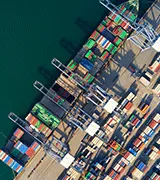Much has changed in the economic outlook over the last few months. Rather than seeing a modest expansion, the world is fast plunging into a steep downturn. The spread of coronavirus, and of the measures put in place to stop it is having large negative effects on financial markets and on activity. Share prices in Europe and America have fallen by 25 to 30 per cent from their February peaks. More importantly, output and employment are also slumping. A deep global recession in the first half of 2020 is now inevitable and a hoped-for sharp recovery in the second half of the year looks less and less probable by the day.
Forecasts are, at the present time, particularly uncertain. For one thing there is, as yet, hardly any hard data (outside China) that provide information on how much output has been lost in February-March (in China the losses seem to have been massive and the first survey and labour market evidence for Europe and America suggests similar outcomes). For another, it is virtually impossible to foresee when the epidemic will stop. Various governments, using medical advice and China’s experience, have suggested that by summer or early autumn things will gradually return to normal, but such statements may well be optimistic. In the circumstances, all one can say is that the forecasts made at present are almost certainly underestimating the size of the recession. Just one example shows how quickly the world has been changing. In mid-February, Oxford Economics was expecting the global economy to grow by 2.3 per cent this year. By early March, this forecast had been trimmed to 2.0 per cent. By late March it had been reduced to a range going from zero to -1.4. A downward revision in April to an even larger negative figure seems almost certain.
Other forecasting bodies are following suit. The Washington Institute for International Finance has, between early and end-March, downgraded its forecast for world growth in 2020 from 1.6 to -1.5 per cent. According to the late March view of the Economist Intelligence Unit, world GDP will fall by 2.2 per cent this year, a similar outcome to the one foreseen by Fitch Ratings in early April. In absolute terms, the biggest revisions have been made for China and the Eurozone. Rather than growing at close to 5 or 6 per cent, as was hoped for only a few weeks ago, China might even post a small negative figure. As for the Eurozone, an expectation of virtual stagnation has given way to forecast drops of – 5 to -6 per cent (with -7 per cent for Italy). Virtually everywhere, 2020 is now expected to record worse outcomes than those experienced during the Great Recession of 2009. Moreover, the risks to these forecasts are clearly on the downside. The OECD has estimated that a six months lockdown could reduce output by between 8 to 12 percentage points in an average member country and emerging markets may well suffer disproportionately. Expect significant further downgrades for all economies in coming months should social distancing restrictions be extended.
Economic policy has responded rapidly and forcefully almost everywhere. Central Banks have cut interest rates in those countries in which there was still scope to do so (e.g. the U.S. and the UK), have everywhere (including the Eurozone) reassured countries that intervention in the bond market would continue by expanding quantitative easing, have extended credit guarantees to banks so as to keep up the volume of credit, etc. Interestingly, the European Central Bank’s president, Christine Lagarde and several Eurozone governments have hinted at the possibility of issuing a so-called Coronabond (de facto a Eurobond). There is strong opposition to such a move in several Northern countries, but extreme times may call for extreme measures.
These are clearly being taken on the fiscal policy front (even if there is very little international coordination). The idea of so-called “helicopter money” (i.e. direct transfers of cash from the Treasury or the central bank to firms and citizens, is no longer taboo). The U.S. will be distributing cheques worth $ 1,200 to qualified citizens. While welcome, this is probably a second-best policy. First-best would be a direct wage subsidy which would preserve employment. This approach is being pursued in Europe. The UK has promised to pay up to 80 percent of wages on condition that firms do not fire their workers. Similar schemes have already been introduced, or are being put in place, in the Eurozone, notably in Germany (where they had been very effective in sustaining employment during the Great Recession of 2009). Efforts are also being made to help the self-employed. In addition, the EU’s Stability Pact which limits budget deficits to 3 per cent of GDP has been suspended, thus allowing countries to raise spending and postponing or even forfeiting tax receipts. Rough estimates of the sums involved suggest that the efforts taken or planned will easily outstrip what was done in 2009. None of this will prevent the recession, but it should at least limit its extent and, hopefully also its duration.
Inevitably, the money supply will grow as will public sector debt and budget deficits (even Germany is suspending its constitutional debt rule which limits the structural deficit to 0.35 percent of GDP). But debt financing is unlikely to be much of a problem given that interest rates are exceptionally low. The ECB stands ready to buy very large amounts of government bonds and financing deficits by printing money is no longer, at least in some countries, considered a mortal sin. As for the effects of monetary expansion on inflation, there would be plenty of time before these emerged for policy to react in an appropriate way.
In principle, once the medical emergency is over, economies should rebound forcefully, especially if the fiscal and monetary policy measures taken have moderated the rise in unemployment and the incidence of bankruptcies. In other words, the world economy’s shape should resemble that of the letter V, a sharp fall followed by a sharp rise (a growth rate of 4½ per cent, for instance, has been penciled in for the world economy in 2021 by Oxford Economics). The danger of a U- shaped cycle, let alone of an L-shaped one cannot, however, be discounted. China’s experience in coming months should provide indications as to which scenario is most likely for the world economy.

By Professor Andrea Boltho, Kroll Real Estate Advisory Group (REAG) Advisory Board Member Emeritus Fellow, Magdalen College, University of Oxford








